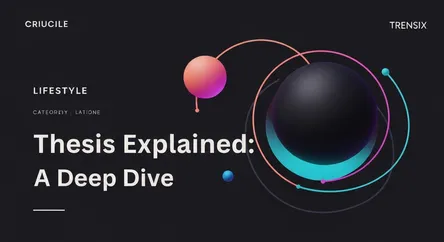Lifestyle
Thesis Explained: A Deep Dive

Discover what a thesis is, its crucial role in higher education, and how this capstone research project shapes academic and professional futures.
What is it?
A thesis, or dissertation, is a substantial document presenting the author's research and findings, submitted in support of their candidacy for an academic degree or professional qualification. Typically the culmination of a master's or doctoral program, it requires students to identify a research question, conduct an extensive literature review, and perform original research to address it. A thesis demonstrates a student's mastery of their subject, ability to conduct independent research, and skill in scholarly communication. Its structure usually includes an introduction, methodology, results, discussion, and conclusion, all meticulously cited.
Why is it trending?
The concept of a thesis is constantly relevant in academic circles as a benchmark of higher learning. Recently, trends have shifted towards interdisciplinary topics, reflecting a more connected academic world. The rise of digital archives and open-access journals has made theses more accessible to the public, increasing their visibility and impact beyond university walls. Furthermore, discussions around the mental health challenges and financial pressures associated with graduate research keep the topic of thesis writing prominent in educational and social discourse.
How does it affect people?
For students, writing a thesis is a transformative, albeit demanding, experience. It hones critical thinking, project management, and analytical skills that are invaluable in any career. Successfully defending a thesis is a major personal and professional milestone, signifying expertise and opening doors to academia or specialized industries. However, the process can be isolating and stressful, impacting students' mental well-being and personal lives. For the broader academic community, a well-researched thesis contributes new knowledge to a field, pushing the boundaries of understanding and inspiring future research.